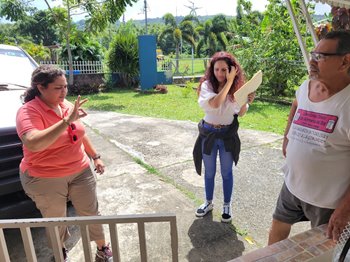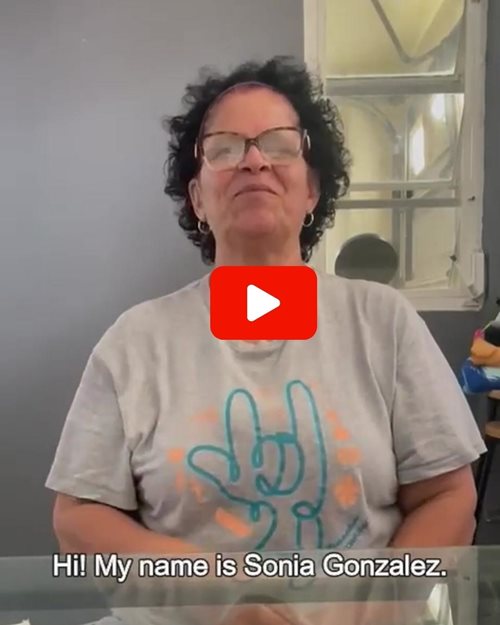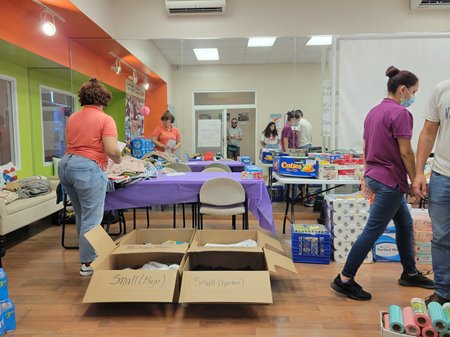When Puerto Rico Neighborhood Housing Services (NHS) reached out to potential future homeowners, the nonprofit wanted to connect with as many people as they could. That included the hearing-impaired community. So, with funding from the state government and a HUD community block development grant, Puerto Rico NHS provided interpreters for their programs and promoted classes for people who are hearing impaired.
 Equal housing is law, and translation services are certainly a part of that. But Puerto Rico NHS went steps farther in outreach and in the courses they offered. "Loans and loss have hit this population hard," says Cristian Miranda Velez, program director at the nonprofit. "They need to be protected."
Equal housing is law, and translation services are certainly a part of that. But Puerto Rico NHS went steps farther in outreach and in the courses they offered. "Loans and loss have hit this population hard," says Cristian Miranda Velez, program director at the nonprofit. "They need to be protected."Interpreters are available for participants to learn about saving, credit-building and becoming a first-time homebuyer. In 2021, Puerto Rico NHS also began providing classes exclusively for the hearing impaired. Since then, participation has increased, doubling from six participants in 2021 to a dozen in 2022.
One of the participants was Sonia Gonzalez, who hopes to become a homebuyer. "Thanks to the courses in the housing program, I now know how to manage my money and make a budget in order to be able to buy a house in the near future," she says. 

Miranda Velez's staff has frequent meetings with the interpreters to gather their feedback on how to improve day-to-day services, and has tweaked a few things in response. When they learned most participants took classes on their phones, they found a way to increase the size of the interpreter's window on the video screen so no one would have to strain to see. They also provided informal, introductory classes in American Sign Language for their staff, led by the interpreters "in order for us to understand a little better. We get feedback and we adjust."
Adjustments may mean more pauses when staff present workshops, to allow interpreters time to catch up. "Sometimes people are shy and don't let us know when they don't understand some of the terminology – the terminology can be confusing when you're talking about lending," says Miranda Velez. Loan ratios and loan types, for example, and terms like "conventional conforming" and "default." "What we do is break them down and use easier ways to describe them.
Miranda Velez says his organization has worked with clients on credit, getting them on the path to homeownership. After getting "credit-ready," some of the first hearing-impaired clients to go through their program are close to being homeownership-ready, too. Puerto Rico NHS expects them to be able to purchase a new home soon.
"We're getting positive feedback," he says. "The challenge is always more participation." But as they are able to share more success stories, he says he expects the program numbers to increase.
"Preparing for homeownership doesn't have to be confusing if you have the right help," says Noelle Melton, Vice President , National Homeownership Programs & Lending. "Puerto Rico NHS is a great example of how our network learns who is in their community and the unique needs they may have. Then, they find a way to meet them where they are."
NHS Puerto Rico's link to the deaf community continues in other ways, too. In 2022, when Hurricane
 Staff on a site visit after the hurricane. Photo/Puerto Rico NHS
Fiona struck the island, the nonprofit used funding from NeighborWorks America to reach out to and aid the population, especially in Orocovis, a small, rural town at the center of the island that has a large hearing-impaired population. "They couldn't call to ask for help," Miranda Velez says. So NHS Puerto Rico went with an interpreter to the community to assess the need. "It was a very humbling experience."
Staff on a site visit after the hurricane. Photo/Puerto Rico NHS
Fiona struck the island, the nonprofit used funding from NeighborWorks America to reach out to and aid the population, especially in Orocovis, a small, rural town at the center of the island that has a large hearing-impaired population. "They couldn't call to ask for help," Miranda Velez says. So NHS Puerto Rico went with an interpreter to the community to assess the need. "It was a very humbling experience."

Helping this community remains a priority. "We have a whole narrative about being inclusive," Miranda Velez says. "We talk about color and race. But the deaf community is something we need to include, too. It's a learning example for all of us."

